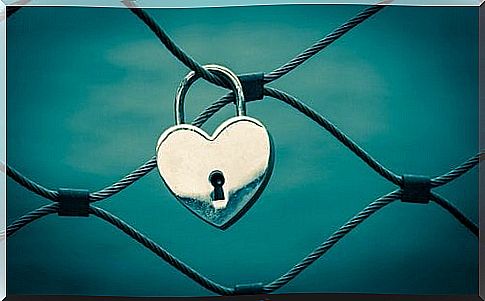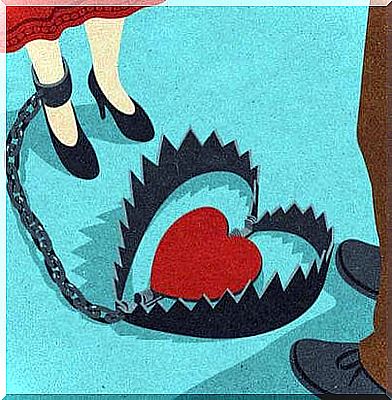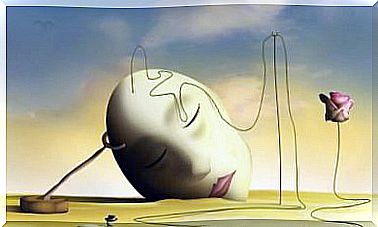Why Are We Prone To Emotional Dependence?

Each of us, whether we are a man or a woman, young or old, can have a relationship based on emotional dependence. Sometimes we think things like this can’t happen to us. But it’s worth remembering that the people in these kinds of relationships also thought they weren’t prone to emotional dependency.
So, before we let our statements become so radical, let’s ask ourselves something first. What causes us to end up in a relationship based on dependency? What do we feel in this kind of relationship? How can we know if our relationship is based on dependency or not?
If we are aware of the signs of a dependent relationship, it will be easier to determine whether we are in a dependent relationship ourselves. Whether we exposed ourselves to such a dysfunctional bond. This can give us extra strength to change the situation. We can also detect when others are in these predicaments. So we can try to warn them.
Why are we prone to emotional dependence?
We all have expectations of ourselves and of our partner, which we would like to fulfill. These ideas are influenced by social and cultural beliefs. In our case, we have been taught that to be happy we need a romantic partner. We must also prioritize this partner above all else (Castelló, 2006).
We are constantly looking for a love relationship to make us whole, so that it can fill the voids in us. We look outside of ourselves instead of looking inward. This makes us just not enough for ourselves. We feed our fears and look to others to hide them.

On the other hand, the way we make love bonds is strongly conditioned by the way we experienced attachment behavior during childhood (Guix, 2011). For example, if we were overprotected, we will be insecure and look for people who can protect us. On the other hand, if we have received little or no affection at all, we will desperately look for someone who can give us the affection we need.
Prone to Emotional Dependence: Mimicking…
The relationship we see in our parents will also affect our own romantic relationships. For example, if in childhood we saw a relationship based on dominance and dependence, in which love and abuse seemed to go hand in hand, we as adults may also be prone to such relationships. We are then prone to emotional dependence. Especially because we know exactly with which mechanisms we can maintain this kind of relationship.
Anyway, it would be ideal if we didn’t go looking for our other half to make us whole. Because this person simply does not exist. The truth is that each of us is already complete and whole in ourselves. We are responsible for our own happiness. Furthermore, we have to establish our own criteria when it comes to determining how we want to interact with our partner. We should not be influenced too much by the patterns of others. It’s important to be clear about what we want and don’t want in a relationship.
Prone to Emotional Dependence: What Do We Feel in These Types of Relationships?
In a relationship based on emotional dependence, we cannot be ourselves. We feel limited and defeated, we always want to reassure our partner and not upset them. Fear, mistrust, guilt, and nervousness are all common emotions. These are “symptoms” that can be the product of low self-esteem. Someone in such a relationship may feel like they are worthless or subservient to their partner. He needs his partner excessively and is afraid or intolerant of loneliness.

Plus, when we’re in a toxic relationship, we tend to put up with more than we should. We accept obnoxious remarks that put us down, insulting looks and silent treatment, blame, intimidation, constant demands to control us, lies… Sometimes there is even verbal and physical aggression. In certain cases, we idealize our partner in such a way that we come up with all sorts of excuses for his behavior. Think of things like, “He’s just tired,” “He’s nervous,” “At least he’s trying his best,” etc. We often think that the person will change. Other times, the things we see outside of our relationship make us stay.
How do we know if our relationship is based on emotional dependence or not?
It’s not easy to see if your relationship is based on emotional dependence. Yet there are always indicators and signs that reflect this dysfunction. For example, our emotions can give very clear clues. Our own emotions can show us that the relationship is not working well. In a healthy relationship we would not be afraid or suffer.
In a relationship, it’s easy to lose your perspective and only see the things you like about your partner. In fact, we become blind to the things we don’t want to see. Often we only wake up when we have been on the wrong path for a long time (Grad, 2015). That is why it is important to listen and heed the sincere advice of the people who know us well. But don’t follow their suggestions blindly and systematically either. As unpleasant as it can be when others say ‘he’s not good for you, you have to leave’. We may think they just don’t understand it, but… maybe they’re right.

After all, love is a free choice…
But why do we put up with a relationship in which we suffer? Especially when it is supposedly a free choice that we made ourselves because we felt that our partner was an important source of trust and support. Someone who would stand by our side unconditionally. If not, you may need to end your relationship or reconsider the situation.
The truth is that we can have a healthy relationship, without dependence or suffering, based on trust and respect. Even though we are prone to emotional dependence. For this it is important to keep in mind that part of the responsibility lies with us. We are not responsible for what the other person does. We are only responsible for what we do ourselves. If we change (take action or ask for help), the situation will also change.









